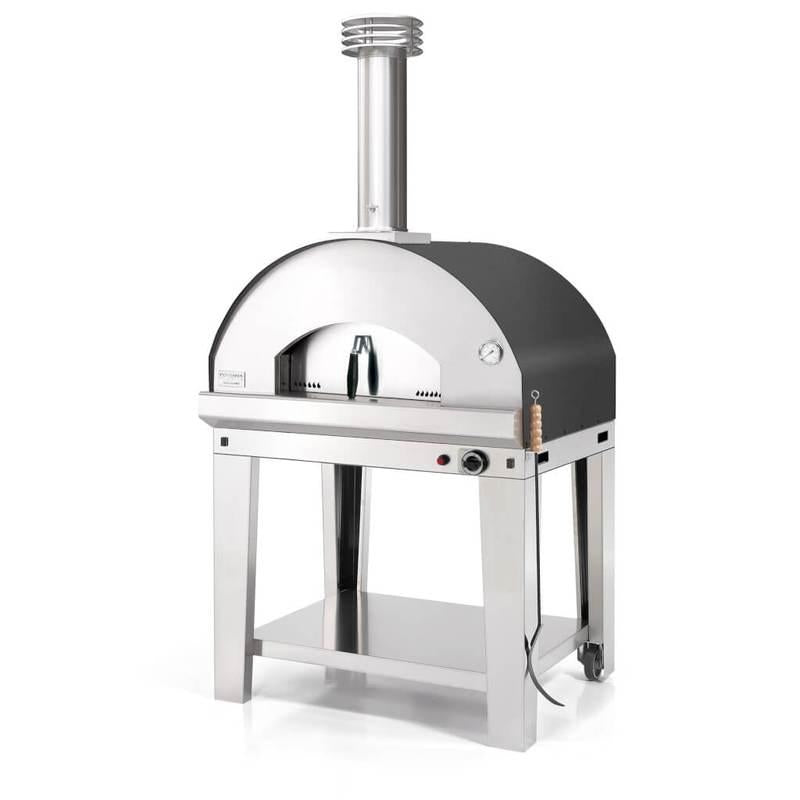Gas vs. Wood Fired Pizza Ovens: Which Is Best for You?

If you’ve been shopping for a pizza oven, you’ve seen two choices: wood or gas. Each has its benefits and disadvantages, which can make it difficult to choose the best pizza oven for you. We take a closer look at the differences between the two oven types to help you make the best decision.
Gas Pizza Ovens
Gas pizza ovens can be powered by either natural gas or propane. A gas-fired pizza oven offers ease-of-use. Like a conventional oven, all you have to do is turn it on. Gas also allows fast preheating of the oven before you cook.
The flame in these ovens is stationary, and the dome or top of the oven receives the heat first before making its way down the sides to the bottom
Gas offers high temperatures like wood ovens do, but it allows you to cook without the need for wood or the production of ash and soot, making it the cleaner option. Many gas ovens also provide a cooking area that’s slightly larger than a wood oven.
Because of the fuel, however, gas ovens require installation by a professional.
Wood-Fired Pizza Ovens
A wood fired pizza oven is powered by wood alone. First, you must select a dry hardwood, cut it (pieces that are 2”-3: diameter max), and then place it in the oven before lighting. The wood you select matters; you will want to choose hardwoods like apple, cherry, oak, or maple.
The flame in this type of traditional pizza oven is not stationary. The heat of the open flame is intense and, when paired with the heat-holding interior of the wood oven, can mean faster cooking times, although these ovens may take longer overall to heat.
Soot and ash will need to be cleaned up after each use with our wood-fired oven models. However, the ash from a wood pizza oven can be used as a nutrient-rich natural garden fertilizer.
As well, using hardwoods means a hotter cooking environment. The use of wood allows the smoke from burning hardwoods to become infused in your food, providing plenty of variety in flavor.
Which Is Better: Propane or Wood Pizza Oven?
When deciding between a propane or wood pizza oven, it's not about which one is better overall, but which one aligns with your specific needs and preferences. Here’s a concise comparison to help you decide:
|
Feature |
Propane Pizza Oven |
Wood Pizza Oven |
|
Operation |
Turn on switch for immediate heating |
Requires building and maintaining a fire |
|
Maintenance |
Minimal; no ash cleanup |
Ash and soot cleanup after use |
|
Flavor |
Consistent flavor |
Smoky, varied flavors from different woods |
|
Temperature Control |
Precise and easy to adjust |
Requires experience to control |
|
Convenience |
Quick preheating; less hands-on |
More time-consuming and hands-on |
|
Cooking Area |
Slightly larger cooking area |
Standard size; may vary by model |
|
Authenticity |
Modern approach to pizza making |
Traditional, rustic pizza-making experience |
Which One Will You Choose?

Now that we’ve compared wood-burning vs. gas pizza ovens, the answer depends on you. If you have a busy family that wants a fast and convenient way to cook their meals, you may benefit from a gas oven. Those who enjoy experimenting with different flavors offered by various woods, and who want a more traditional cooking experience, may benefit more from a wood-fired oven.
Fontana Forni ovens offer you the best of both worlds; all of our gas and wood-fired pizza ovens feature modern materials and 100% Italian construction. Discover the benefits of our pizza ovens online or call 877-842-9822.



